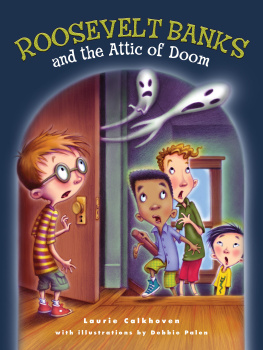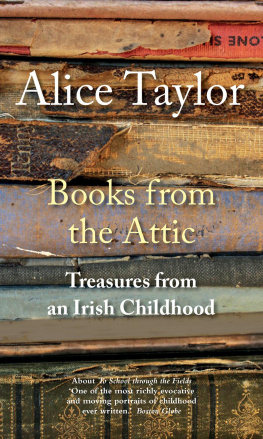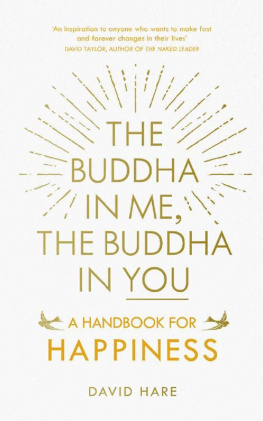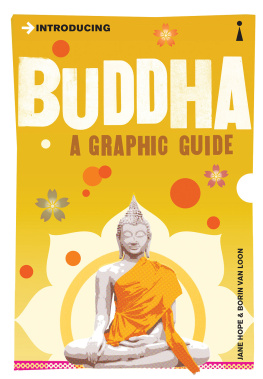Julie Otsuka - The Buddha in the Attic
Here you can read online Julie Otsuka - The Buddha in the Attic full text of the book (entire story) in english for free. Download pdf and epub, get meaning, cover and reviews about this ebook. year: 2011, publisher: Knopf Doubleday Publishing Group, genre: Home and family. Description of the work, (preface) as well as reviews are available. Best literature library LitArk.com created for fans of good reading and offers a wide selection of genres:
Romance novel
Science fiction
Adventure
Detective
Science
History
Home and family
Prose
Art
Politics
Computer
Non-fiction
Religion
Business
Children
Humor
Choose a favorite category and find really read worthwhile books. Enjoy immersion in the world of imagination, feel the emotions of the characters or learn something new for yourself, make an fascinating discovery.

- Book:The Buddha in the Attic
- Author:
- Publisher:Knopf Doubleday Publishing Group
- Genre:
- Year:2011
- Rating:4 / 5
- Favourites:Add to favourites
- Your mark:
- 80
- 1
- 2
- 3
- 4
- 5
The Buddha in the Attic: summary, description and annotation
We offer to read an annotation, description, summary or preface (depends on what the author of the book "The Buddha in the Attic" wrote himself). If you haven't found the necessary information about the book — write in the comments, we will try to find it.
The Buddha in the Attic — read online for free the complete book (whole text) full work
Below is the text of the book, divided by pages. System saving the place of the last page read, allows you to conveniently read the book "The Buddha in the Attic" online for free, without having to search again every time where you left off. Put a bookmark, and you can go to the page where you finished reading at any time.
Font size:
Interval:
Bookmark:
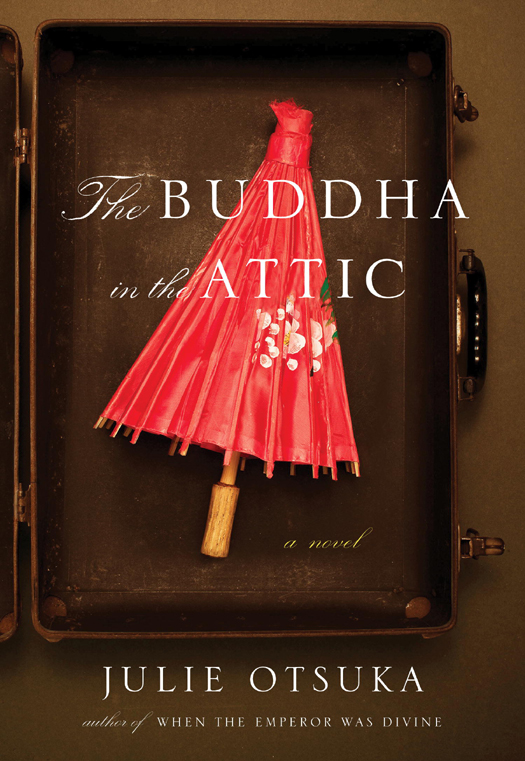
ALSO BY JULIE OTSUKA
When the Emperor Was Divine
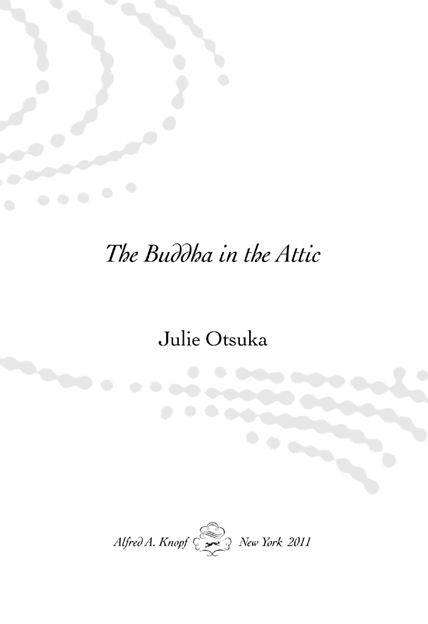
THIS IS A BORZOI BOOK
PUBLISHED BY ALFRED A. KNOPF
Copyright 2011 by Julie Otsuka, Inc.
All rights reserved. Published in the United States by Alfred A. Knopf,
a division of Random House, Inc., New York, and in Canada by
Random House of Canada Limited, Toronto.
www.aaknopf.com
Knopf, Borzoi Books, and the colophon are registered trademarks of
Random House, Inc.
Chapters of this novel were originally published in slightly different form in
the following magazines: Come, Japanese! and The Children in Granta
and Whites in Harpers.
Grateful acknowledgement is made to Grove/Atlantic, Inc.
for permission to reprint Haiku by Masahide from
Zen Poetry: Let the Spring Breeze Enter,
translated and edited by Lucien Stryk and Takashi Ikemoto,
copyright 1995 by Lucien Stryk.
Library of Congress Cataloging-in-Publication Data
Otsuka, Julie, [date]
The Buddha in the attic / Julie Otsuka.1st ed.
p. cm.
This is a Borzoi book.
eISBN: 978-0-307-70046-9
1. Mail-order bridesFiction. 2. JapaneseCaliforniaFiction.
3. San Francisco (Calif.)History20th centuryFiction.
I. Title
PS3615.T88B83 2011
813.6dc22 2011013568
This is a work of fiction. Names, characters, places, and incidents either
are the product of the authors imagination or are used fictitiously.
Any resemblance to actual persons, living or dead, events,
or locales is entirely coincidental.
Jacket photograph by John Clark
Jacket design by Gabriele Wilson
v3.1
For Andy
There be of them, that have left a name behind them, that their praises might be reported. And some there be, which have no memorial; who are perished, as though they had never been; and are become as though they had never been born; and their children after them.
ECCLESIASTICUS 44:89
Barns burnt down
now
I can see the moon.
MASAHIDE
O n the boat we were mostly virgins. We had long black hair and flat wide feet and we were not very tall. Some of us had eaten nothing but rice gruel as young girls and had slightly bowed legs, and some of us were only fourteen years old and were still young girls ourselves. Some of us came from the city, and wore stylish city clothes, but many more of us came from the country and on the boat we wore the same old kimonos wed been wearing for yearsfaded hand-me-downs from our sisters that had been patched and redyed many times. Some of us came from the mountains, and had never before seen the sea, except for in pictures, and some of us were the daughters of fishermen who had been around the sea all our lives. Perhaps we had lost a brother or father to the sea, or a fianc, or perhaps someone we loved had jumped into the water one unhappy morning and simply swum away, and now it was time for us, too, to move on.
ON THE BOAT the first thing we didbefore deciding who we liked and didnt like, before telling each other which one of the islands we were from, and why we were leaving, before even bothering to learn each others nameswas compare photographs of our husbands. They were handsome young men with dark eyes and full heads of hair and skin that was smooth and unblemished. Their chins were strong. Their posture, good. Their noses were straight and high. They looked like our brothers and fathers back home, only better dressed, in gray frock coats and fine Western three-piece suits. Some of them were standing on sidewalks in front of wooden A-frame houses with white picket fences and neatly mowed lawns, and some were leaning in driveways against Model T Fords. Some were sitting in studios on stiff high-backed chairs with their hands neatly folded and staring straight into the camera, as though they were ready to take on the world. All of them had promised to be there, waiting for us, in San Francisco, when we sailed into port.
ON THE BOAT , we often wondered: Would we like them? Would we love them? Would we recognize them from their pictures when we first saw them on the dock?
ON THE BOAT we slept down below, in steerage, where it was filthy and dim. Our beds were narrow metal racks stacked one on top of the other and our mattresses were hard and thin and darkened with the stains of other journeys, other lives. Our pillows were stuffed with dried wheat hulls. Scraps of food littered the passageways between berths and the floors were wet and slick. There was one porthole, and in the evening, after the hatch was closed, the darkness filled with whispers. Will it hurt? Bodies tossed and turned beneath the blankets. The sea rose and fell. The damp air stifled. At night we dreamed of our husbands. We dreamed of new wooden sandals and endless bolts of indigo silk and of living, one day, in a house with a chimney. We dreamed we were lovely and tall. We dreamed we were back in the rice paddies, which we had so desperately wanted to escape. The rice paddy dreams were always nightmares. We dreamed of our older and prettier sisters who had been sold to the geisha houses by our fathers so that the rest of us might eat, and when we woke we were gasping for air. For a second I thought I was her.
OUR FIRST FEW DAYS on the boat we were seasick, and could not keep down our food, and had to make repeated trips to the railing. Some of us were so dizzy we could not even walk, and lay in our berths in a dull stupor, unable to remember our own names, not to mention those of our new husbands. Remind me one more time, Im Mrs. Who? Some of us clutched our stomachs and prayed out loud to Kannon, the goddess of mercyWhere are you?while others of us preferred to turn silently green. And often, in the middle of the night, we were jolted awake by a violent swell and for a brief moment we had no idea where we were, or why our beds would not stop moving, or why our hearts were pounding with such dread. Earthquake was the first thought that usually came to our minds. We reached out for our mothers then, in whose arms we had slept until the morning we left home. Were they sleeping now? Were they dreaming? Were they thinking of us night and day? Were they still walking three steps behind our fathers on the streets with their arms full of packages while our fathers carried nothing at all? Were they secretly envious of us for sailing away? Didnt I give you everything? Had they remembered to air out our old kimonos? Had they remembered to feed the cats? Had they made sure to tell us everything we needed to know? Hold your teacup with both hands, stay out of the sun, never say more than you have to.
MOST OF US on the boat were accomplished, and were sure we would make good wives. We knew how to cook and sew. We knew how to serve tea and arrange flowers and sit quietly on our flat wide feet for hours, saying absolutely nothing of substance at all. A girl must blend into a room: she must be present without appearing to exist. We knew how to behave at funerals, and how to write short, melancholy poems about the passing of autumn that were exactly seventeen syllables long. We knew how to pull weeds and chop kindling and haul water, and one of usthe rice millers daughterknew how to walk two miles into town with an eighty-pound sack of rice on her back without once breaking into a sweat.
Font size:
Interval:
Bookmark:
Similar books «The Buddha in the Attic»
Look at similar books to The Buddha in the Attic. We have selected literature similar in name and meaning in the hope of providing readers with more options to find new, interesting, not yet read works.
Discussion, reviews of the book The Buddha in the Attic and just readers' own opinions. Leave your comments, write what you think about the work, its meaning or the main characters. Specify what exactly you liked and what you didn't like, and why you think so.



